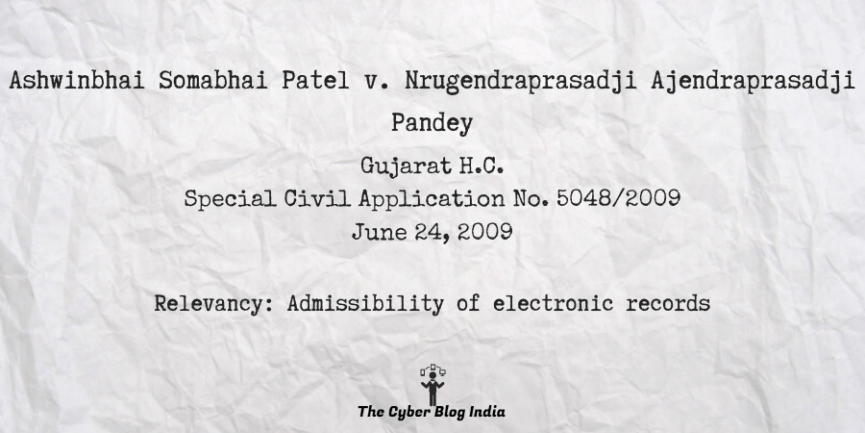Ashwinbhai Somabhai Patel v. Nrugendraprasadji Ajendraprasadji Pandey

Ashwinbhai Somabhai Patel v. Nrugendraprasadji Ajendraprasadji Pandey
(2009) 3 GLH 138
In the High Court of Gujarat
Special Civil Application No. 5048/2009
Before Justice M.R. Shah
Decided on June 24, 2009
Relevancy of the case: Admissibility of electronic records
Statutes & Provisions Involved
- The Constitution of India, 1950 (Article 227)
- The Indian Evidence Act, 1872 (Section 3, 65A, 65B(2))
- The Information Technology (Certifying Authorities) Rules, 2000
- The Registration Act, 1908 (Section 17)
- The Code of Civil Procedure, 1908 (Order 39 Rule 1, Rule 2)
- The Indian Penal Code, 1860 (Section 420)
Relevant Facts of the Case
- This petition was filed by the petitioners under Article 227 of the Constitution of India. In this petition, the petitioner has prayed for an appropriate writ, direction or order to set aside the order passed by the Principal Senior Civil Judge. In the aforementioned order, the judge permitted the admissibility of digital evidence (CD) submitted by the plaintiff for hearing and adjudication purposes.
- The petitioner filed a civil suit before the Judge for declaration and to completely ban the respondent from declaring himself as the acharya of several temples. An application was filed by the respondent which stated that the reply to the aforementioned suit was in an electronic form (CD) and requested the judge to permit the respondents to produce, read and to use this during the hearing and adjudication process.
Opinion of the Bench
- The question on the admissibility of the electronic evidence should be replied during the appropriate stage of the trial as per Section 65A and 65B of the Indian Evidence Act, 1872 as well as the Code of Civil Procedure, 1908.
- If at all the judgement is based on this certain evidence and if the oppressed party is of the feeling that such evidence should not have been mulled over while considering the prima facie case, the aforementioned party can make out a ground to appeal before the higher court.
- It seems that the learned trial court has attempted to find the right balance and it has kept open all of the queries concerning the admissibility of evidence. Hence, it cannot be said that the trial court did an error.
Final Decision
- The application was dismissed.
- The aforementioned document was held admissible as evidence and any question regarding the evidence is kept and will be considered during the appropriate stage in the trial.
- Ad-interim relief granted earlier, if any, stands vacated forthwith.
This case summary has been prepared by Akshara Kamath, an undergraduate student at Symbiosis Law School, Hyderabad, during her internship with The Cyber Blog India in June/July 2020.
